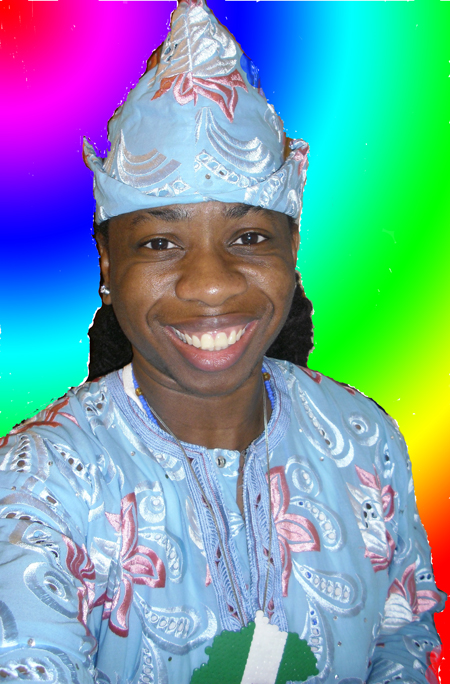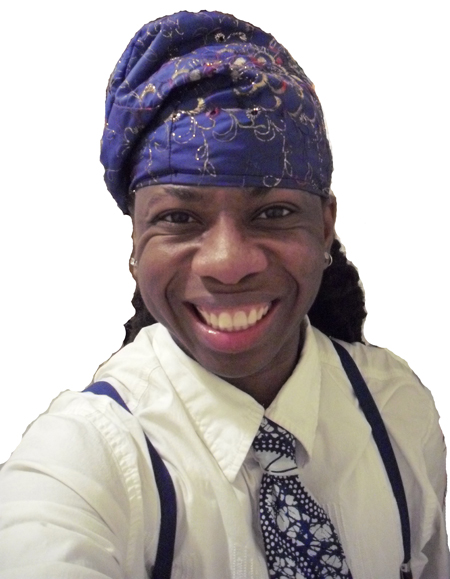
By Oluseyi Oluwakemi Olutoyin Adebanjo
I am Sidikat, the child of Aminat Adelarin Okala Adenike Ayoke Kokumo Asimi Jolaoso
daughter of Sunibi, daughter of Moloran Iyaoloya.
Thank you for my life, mom and ancestors.
I was born in a house in Lagos, Nigeria, at 7pm on 17 October, 1977. When I came out, I was so little you could hold me in one hand. They thought another one was coming out because my mother’s abdomen was so big. My parents are from Isara, which is in Ogun State in Yorubaland in southwestern Nigeria. I give great thanks for my lineage, my family, my ancestors, and my country.
My mother’s wish was to turn 65 years old in her own country after years of absence from her home. I took my mom home for her birthday present, and that is how I got to see the connections clearly of where I come from and who I am in relation to my family. I got to see my mother with her family and see the relatives I didn’t see when I went alone. I got to hear people talk about how they remembered me when I was young: “You never ate a lot of food, so don’t give Toyin a lot of food.” I smiled because I am still like that at times. Aunts told me I look like a lighter version of my dad. Other aunts told me I look like a dark version of my mom.
When I had gone by myself I never heard such things. Now, seeing pictures of my life in Nigeria, I got to see myself in a new way and experience intimacy with my family and my country. My mom showed me one of my baby pictures, and I was surprised to find out I had another name, Oluseyi. It means “god has done” and is a unisex name. Later in my trip, I thought that if I ever transitioned into becoming a male this would be my name.
I have been dressing masculine since the age of six. Mostly slacks, matching shirts, suspenders sometimes. Gone were the iro and buba when my father started dressing me. When I left for New York City, they cut my hair, which is not unusual in Nigeria and other African countries for females. This presentation got me taken for a boy all the time in New York. I remember helping this elderly lady across the street and she said “thank you, young man.”
Anyway, I always felt uncomfortable in dresses. I just didn’t feel that was who I am. Last time I wore a skirt was for my junior high school graduation.
As I grew up I continued dressing in male attire after my father stopped buying my clothes. I had crushes on my female friends in school and college, but I didn’t accept I was queer until 1996 when I started work at the Queer Youth Center District 202 (D202) in Minneapolis, Minnesota. Even so, I came out to my sister as bisexual because that seemed easier, but she said she would tell my mother to get me in trouble. In any case my mother found out a few weeks later when I was on the cover of the LGBT Lavender magazine hugging a white womyn. My sister told my mom, but the funny thing is that she got in more trouble than me for “allowing” this to happen. I did have to step back from being knocked by my mother. She was also upset because of what family in New York and Nigeria would think. She though they would blame her for it. My father heard about it soon afterward. He blamed himself for dressing me as a boy, which had “turned me gay.”
In Minnesota I continued dressing in men’s clothes and would do gender fuck at times to pass as a male. I was calling myself “queer” for my sexuality and “female” for my sex. I never really felt comfortable as a “womyn” and identifying with that part of me. I was directed to countless male bathrooms and dressing rooms because people couldn’t understand that a female would dress the way I did. In the female bathrooms people would check the door twice and I would leave before people or security would card me. The males in my family have tried to beat, oppress, and get the masculine out of me since I was a child.
In my life I have gone from being a man to being “ma’am” at the age of 25 years old. What happened, I have wondered, to cause people to switch from calling me sir to ma’am? My energy had started to shift is what I figured. I had started to do some healing around being a survivor of torture, child sexual abuse, anger, and years of depression. Now at the age of 33 I get called she and he. Since I see myself as two-spirit, gender non-conforming or gender-queer, I can sometimes go with the flow, but at other times it bothers me to no end getting asked in the States, and especially when I go home to Nigeria, if I am a boy or a girl.
When I am in Nigeria it is the worst. Grandmothers will stop me in the street to ask me in Yoruba if I am a man or a woman, and this became the theme of my stays. In 2009 it got so bad that people followed me in the streets, or would stop their soccer game to watch me go by. People would be weight-lifting and turn their heads to look at me instead of paying attention to what they were bench-pressing. The stories could go on and on.
I didn’t always feel safe. I wear traditional Yoruba or Nigerian outfits. I have always worn pants or shokoto and made the tops a bit feminine. I stopped appeasing my parents and have only been wearing traditional male attire for years now.
Besides people asking me what my gender is, they always want to know if I am married. Where is my husband and when will I have kids? When I go back home, I stay with family members and have been hesitant to come out to people. This is hard for me because I have been out of the closet in the States since 1996. It makes going back home stressful. On my last two visits I had to maneuver around the issue because my mom was with me. I didn’t know how much more harassment I wanted to deal with in my visit, especially since I didn’t have my own space where I could breathe. People would try to fix me with up with a husband or try to put me in dresses and jewelry. I would say Nigerian men are ho’s, or that I was still in school and not ready for a husband, but I am sure people knew there was something not straight about me.
I want to be comfortable when I go back home to Nigeria this year. I am debating coming out in Nigeria about being queer and gender non-conforming or genderqueer. I don’t think I have it in me to hide any longer that I want a wife. I know it got me in some trouble with my father and my uncles visiting from Nigeria when I told them about wanting a wife, but I am 33 years old now. Hiding feels so oppressive to me. I would love to hear what other Africans think about me coming out when I go home this year.


